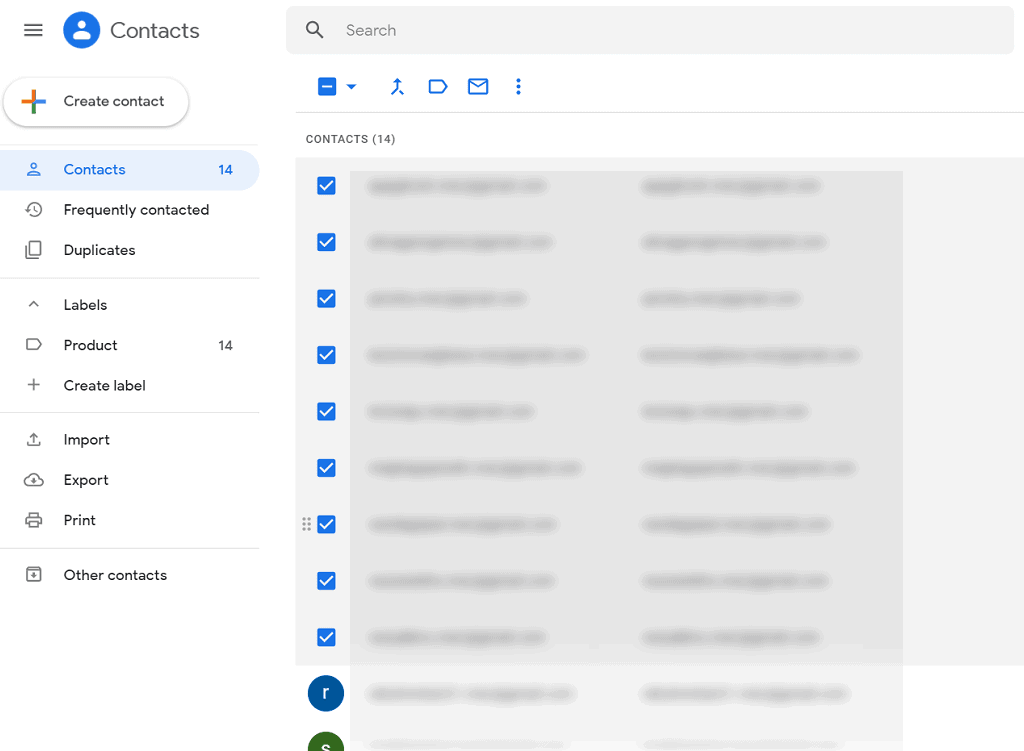Handy Facts To Picking A Oncologist Email list
Wiki Article
What Should I Think About Prior To Buying An Cpa Email List?
When you purchase a CPA (Certified Public Accountant) email list, it's crucial to look at a few key elements to ensure that the list is of the highest quality, compliant with the legal requirements, and relevant to your goals in marketing. Here's what you should take into consideration: 1. Data Accuracy and Quality
Source of Data: Confirm the authenticity of the list. Most trustworthy providers get their data from reliable sources like directories of trade associations, directories for professionals, databases. Avoid lists compiled through scraping or any other method that is not reliable because they could contain inaccurate or outdated information.
Verification process: Examine to see if your email list has been verified recently. This can reduce bounce rates and makes sure you are reaching valid, active email addresses. Find out how often the list is kept up-to-date and maintained, since CPAs often change job or company.
Segmentation and Filters: A great CPA list should provide different ways to segment, including location (city or state, country) and industry expertise (e.g. taxation, auditing and financial planning) and years of experience, or company size. These variables can be utilized to enhance the effectiveness of marketing campaigns, allowing more specific targeting.
2. Legal Regulations
Data Privacy Laws Ensure that your email list complies the relevant local laws and regulations, such as California Consumer Privacy Act, General Data Protection Regulation or General Data Protection Regulation. Lists should contain only email addresses that are legally obtained.
Conformity with the CANSPAM Act: The list used for U.S. commercial email campaigns must comply with the CANSPAM Act. This includes providing opt-out mechanisms and not using misleading subject lines or other content. Infractions can be punished with penalties and other legal issues.
Opt-in Consent: Verify that email addresses were acquired via opt-in consent. This means that the recipient consented to receiving marketing emails from third-party companies. This will reduce the risk of receiving spam complaints and increases engagement.
3. Provider Reputation
The reputation of the provider is something that needs to be investigated thoroughly. Review testimonials, reviews and case studies to see what other customers think. Established firms with proven track records have a higher likelihood to provide accurate and high-quality information.
Transparency. The service provider must make it clear what data is used and when it is changed. This is a warning signal when a provider doesn't be able to clearly explain their methodology.
Customer Support: A dependable customer support service is vital in case you need assistance customizing lists, troubleshooting or understanding the regulations for compliance. A good support team can help you save time and energy during the campaign process.
4. Cost and ROI
Pricing Models. Different service providers have different pricing structures. Some charge per person while others charge a flat-fee or subscription. Check the cost against the expected ROI, balancing price with the standard of the service.
Ask the service provider whether they have a refund policy or replacement policy if there is a significant percentage of email addresses are incorrect or invalid. A guarantee may give you security.
Cost is not the same as. Value: Don't concentrate solely on price. A list's price may seem appealing but it could lead to poor participation or high bounces if its quality is low. Spend money on lists that offer value in terms of data quality and accuracy as well as segmentation.
5. Data Usage and Ownership
If you're looking to purchase a list, you should determine if the list is for a single-time campaign or you will have the list for yourself. Although single-use list may be more affordable, having your own list allows you to conduct longer-term campaigns.
Exclusive vs. Shared lists: Determine if this email list is solely yours or is shared by several buyers. Shared list may result in audience fatigue since recipients have been bombarded by marketing emails.
6. Data Integration and Format
CRM Compatibility. Be sure that the list you send out is in a format that is compatible with the CRM software you are using or to promote email marketing such as CSV. This allows for the easy transfer and management of the data.
User-friendly: How easily can the information be segmented and managed after they have been in your system? Personalization and targeting is more effective if you have a streamlined list.
7. Ethical Questions
Relevance and Value of Content: Because CPAs work hard, it is essential that you send information that is relevant and valuable. Sending irrelevant or spammy messages could harm your reputation and increase complaints.
Avoid sending out too many emails. The excessive frequency of communication could result in spam complaints and unsubscribes. This can affect the reputation of the sender.
The article's conclusion is:
When you purchase a CPA email list, consider data quality, legal compliance, and the provider's reputation to ensure your investment is profitable. The use of segmentation, targeting, and ethical practice will increase engagement and maximize ROI while protecting your brand's image. Follow the pro cpa email list for website recommendations.

What Do I Need To Be Thinking About When Purchasing A Data Appending Machine?
In order to determine if a data appending company is suitable for your needs it is crucial to evaluate several aspects. The service must improve your existing database and keep compliance, accuracy and also ethical standards. Data appending involves adding missing details to your database like demographic information such as phone numbers, email addresses or even phone addresses. Consider these factors when buying appsending services for data. Data Accuracy
Source of data Be sure that the appending provider has reliable and high-quality sources like authentic databases, public records or directories that allow opt-in. The most reliable data providers usually obtain their data from legitimate sources. This ensures that the data appended is current and accurate.
Verification Process: Check if the provider has a thorough process for verifying and validating the data appended. It is important to ensure that the information you get is up-to-date and accurate. The provider should provide periodic updates and data cleaning processes.
Match Rates: Different companies offer different match rates. It is a percentage of the records you have that can be improved with more information. As you strive for accuracy, don't compromise quality to get a more high match rate.
Customization. Based on your requirements, you should make sure that the solution for data append can be customized. This could include different kinds of data, such as demographic, firmographic, or behavioral data.
2. Data Security and Privacy
Conformity with regulations Data appending is the process of processing personal data, therefore it's crucial that the application complies with data protection regulations such as General Data Protection Regulation (GDPR), California Consumer Privacy Act (CCPA) and other applicable privacy laws. Data appended must be collected, used and processed legally to avoid fines.
Consent management: Make sure that the data you are adding comes from individuals who have given their explicit consent to share their data. Avoid data sources based on questionable practices, or that violate the privacy of the users. This could result in legal and ethical concerns.
Data Security. Verify whether the provider takes stringent measures to protect your existing data and the additional data. This includes secure data transfer protocols as well as encryption and access controls.
3. Provider Reputation
Reputable Vendor - Choose one with an established reputation for providing precise data appending services that comply with. You can examine their past performance by reviewing the testimonials, case studies and even reviews. A well-established company is more likely to provide top-quality services, and also ensure that they are in compliance with the law.
Some providers are specialized in specific areas like healthcare, finance or retail. If you're in a specific niche, you should find an expert who has knowledge and know-how in your particular field. They could offer solutions that are tailored to your specific requirements.
4. Costs and Returns on Investment (ROI).
Pricing Models: Data appending services offer a variety of pricing models. They include flat fees for large updates, or per-record charges. Make sure you know how the pricing structure is aligned with your budget. Be wary of extremely low-cost options, as they may be a sign of poor quality data.
Calculate the return on investment potential of incorporating data. A quality service will help you boost engagement, increase conversions, and improve overall performance. Compare the cost against the anticipated benefits of having better, more relevant analytics.
5. Data Types and Appending Options
Types of Data: Take into consideration the kind of data you need appended to your database. Some common types include:
Email addresses are crucial to email marketing campaigns.
Phone numbers are essential for sales outreach or customer service.
Demographic data: beneficial for marketing segmentation and targetting.
The importance of firmographic information is for B2B companies that want to focus their efforts on businesses based on figures for employee numbers, revenue or industry.
Social Media Profiles Several companies offer the option of adding social media handles to online and digital marketing strategies.
6. Data Integration and Format
Compatibility - Ensure that the data you add is compatible with your CRM system or marketing automation tool or other tools. The most common formats are CSV, Excel, or API integration. These formats will allow for simple data import and usage.
Data Cleaning and Enhancement A reliable service provider will provide data cleaning as an appending service. This involves correcting inaccurate information, removing redundant records, and erasing old records. Data enrichment goes beyond just adding data. It enhances the quality of your data.
7. Ethical concerns
Transparency: The service provider must be transparent about where the appended data comes from and how it is collected. The ethical data appending service has strict policies about data collection and use and will ensure that data is collected in a transparent and legal way.
Effect on Engagement: Adding contact details like phone numbers or emails shouldn't lead you to engage in unwelcome and intrusive methods. Make use of appended data in a responsible manner. Use the guidelines to contact with opt-out options and ensure privacy for consumers.
Conclusion
When buying data appending service pay attention to data quality legal compliance, as well as the reputation of the provider. Services that provide secure, verified data and are compliant with privacy regulations such as GDPR or CCPA ought to be given top priority. Apart from making sure that the data you are appending is compatible with systems within your business, consider the ROI on investing in accurate and enriched information. The addition of data can enhance the efficiency of your marketing and business by selecting the best supplier. View the expert data appending services for website info.
